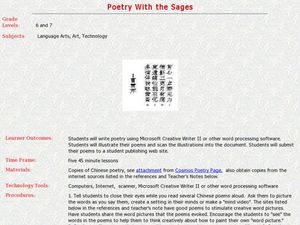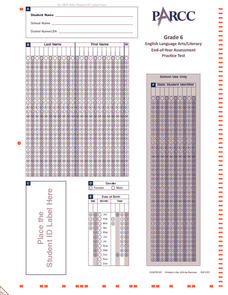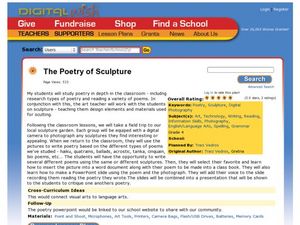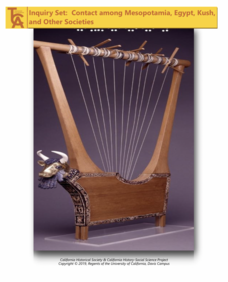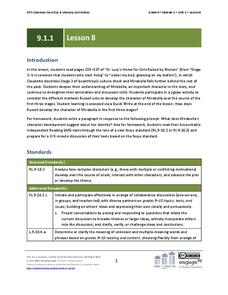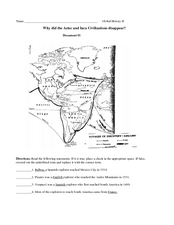Farmington Public Schools
British Literature Honors: Beowulf
Whether new to teaching Beowulf or an experience pro, you'll find much to like in a richly detailed unit plan that asks readers to consider how the epic represents the difficulty in defining good and evil but also reflects the changing...
Curated OER
Primary Source Activity: Jose Marti
Analyze a primary source document "Our America" which depicts a Spanish-American point of view. The class answers 3 critical-thinking questions based on the reading and create a time line of Cuba's struggle for independence.
Curated OER
Poetry With the Sages
Students write poems and input them into a word processing program. In this poetry lesson, students listen to Chinese poems and draw mental images. Students compose poems and illustrate them. Students share their work.
Curated OER
Performance-Based Assessment Practice Test (Grade 4 ELA/Literacy)
Track the progress of your fourth graders' reading and writing skills with this practice Common Core assessment. Based on a collection of six reading passages that include narrative stories, poetry, and a series of informational...
Curated OER
End-of-Year Practice Test (Grade 6 ELA/Literacy)
With the end of the year quickly approaching it's time to find out exactly how much your sixth graders have learned. Specifically designed for the Common Core ELA standards, this practice test gives students five reading passages,...
K12 Reader
"How Do I Love Thee?" Supporting Ideas
Show your class what poem the famous line "How do I love thee? Let me count the ways" comes from. Class members read Elizabeth Barrett Browning's poem and respond to one question with a short paragraph. The question asks learners to use...
Maryland Department of Education
The Concept of Diversity in World Literature Lesson 9: Debating Imperialism
To gain an understanding of Imperialism, class members read Rudyard Kipling's poem, "The White Man's Burden" and Mark Twain's essay, "To the Person Sitting in Darkness." Groups compare these perceptions of non-white cultures with the...
Alabama Learning Exchange
Edgar Allan Poe's Journey Through Life and Literature
How was Edgar Allan Poe able to create "intriguing, memorable, and lasting literature"? To answer this question, learners analyze the syntax, diction, and characterizations in Poe's poems and short stories and compare the impact of these...
Curated OER
The Poetry of Sculpture
Fourth graders practice writing poetry while examining all types of art. In this art analysis lesson, 4th graders participate in a field trip to a sculpture garden in which they view sculptures and create different forms of poetry about...
Curated OER
It's All Poetry to Me!
Fourth graders explore language arts by analyzing poetry styles. In this writing analysis lesson, 4th graders read several sample poems in class and identify similes, metaphors and other figurative language within them. Students analyze...
University of California
Contact among Mesopotamia, Egypt, Kush, and Other Societies
Trade has always been a global affair. Explore what global trade meant for ancient Mesopotamians, Egyptians, and Kushites using a collection of documents from the historic societies. By examining literary works such as the Epic of...
Center for History Education
Who Fired the Shot Heard Round the World?
Take a closer look. Young academics become detectives in an engaging lesson on the American Revolution. Scholars work in groups to analyze documents to uncover whether the American colonists or British soldiers fired the first shot at...
Library of Congress
The Harlem Renaissance
The Harlem Renaissance brought forth many American art forms including jazz, and the writings of Zora Neale Hurston and Langston Hughes. Using a carefully curated set of documents from the Library of Congress, pupils see the cultural...
Brethren High School
Romanticism Through the Eyes of Art, Poetry, and Technology
Use this simple collaborative activity to introduce the definition, art, and poetry of romanticism. Educators will have to provide the poetry, images of the art, and the survey for the learners, but by using this resource, they won't...
Curated OER
The Effects of Slavery
The emotional and spiritual oppression of slavery in the African-American experience is the focus of this lesson. Middle schoolers analyze various texts by Frederick Douglass and Maya Angelou related to freedom and oppression. They use...
Curated OER
Using Primary Sources to Study the Holocaust
Engage your middle schoolers with Pastor Martin Niemoller's famous poem that begins, "First they came for the communists." Now that you have their attention, send learners to the various work stations you created to have them explore...
EngageNY
Grade 9 ELA Module 1, Unit 1, Lesson 8
You can often track a character's development based on others' reactions to their words or actions. Using Karen Russell's "St. Lucy's Home for Girls Raised by Wolves," ninth graders work in a jigsaw activity to analyze how Mirabella's...
Alabama Department of Archives and History
How Two Alabamians Remembered Slavery Years Later
Designed to help readers recognize the point of view of the author of a primary source documents and analyze how that point of view influences the reliability of a text, young historians examine two personal letters, one written by...
Curated OER
Why did the Aztec and Inca civilizations disappear?
Middle schoolers can analyze primary source documents to answer the question, "Why did the Aztec and Inca civilizations disappear?" They will read the provided excerpts then answer 11 different questions to uncover the ultimate answer.
Wharton County Community College
Byron, Shelley, & Keats (Later Romantics) Presentation
Rock stars are cool, but not as cool as the ones from the nineteenth century Romantic Movement. Present critical biographical information on the big three, Byron, Shelly, and Keats, before you dive into analysis of their major poems. The...
Lafayette Parrish School System
Teaching Tone and Mood
Tone and Mood are not synonymous! Introduce young readers to these literary devices with a series of exercises that not only point out the significant differences between the terms but also shows them how to identify both the tone and...
Gwinnett County Public Schools
Analysis of the Tuck Everlasting and The Birchbark House Text Exemplars
Looking to introduce some text-based questions into your ELA lessons? Practice the kinds of skills the Common Core demands with the seven text-based questions and the essay prompt provided here. Designed to be a three-day lesson, day one...
Curated OER
The Search for Character!
Fifth graders define character words, look for real-life examples of the traits "in action," and write an acrostic poem based on one of these qualities.
Curated OER
Thornton Wilder's Our Town: The Reader as Writer
Students read a play and create their own play using Thornton Wilder's Our Townas a resource. In this play activity, students analyze how theatrical elements contribute to a play's meanings and effects. Students recognize differences...




